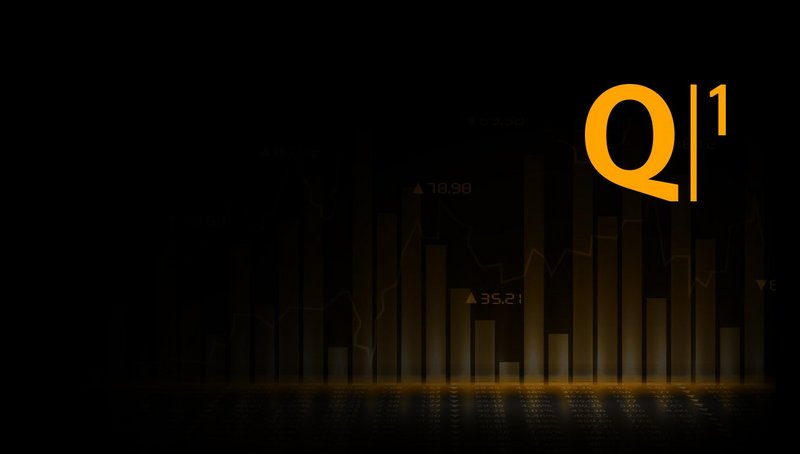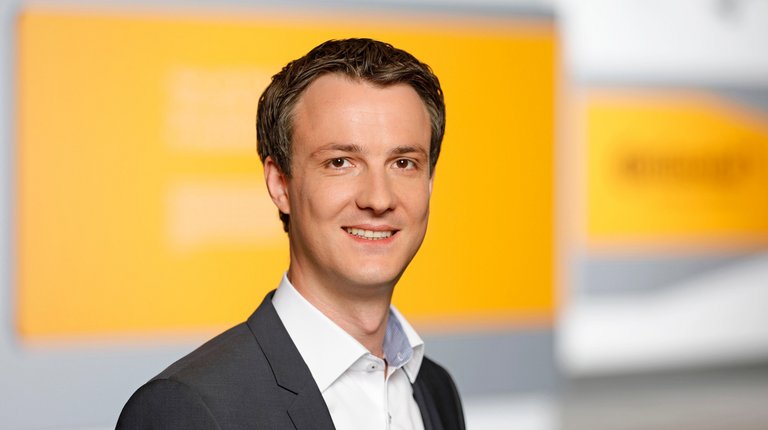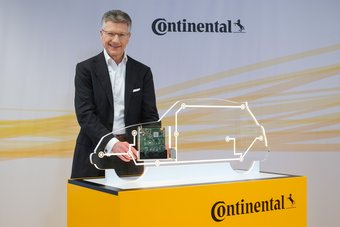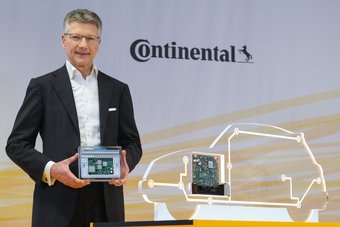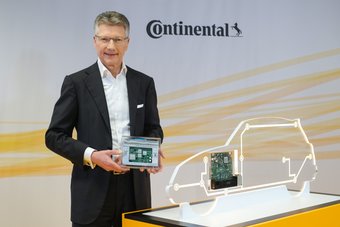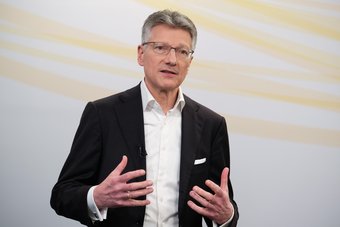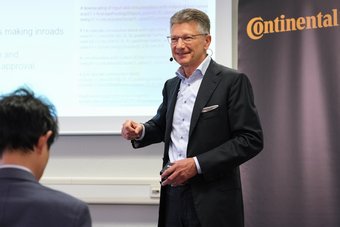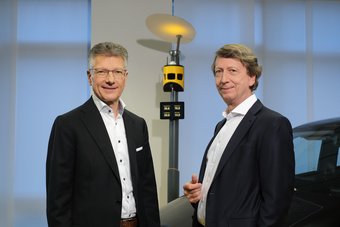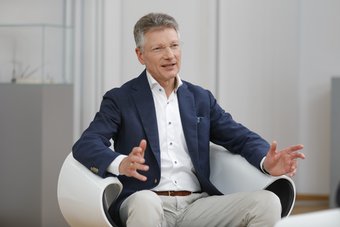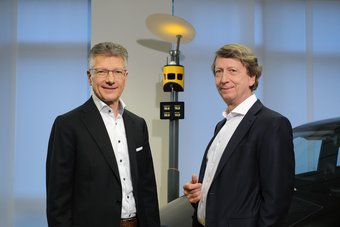First Quarter of 2020: Continental Increases Cost Discipline
- Consolidated sales in the first quarter of €9.8 billion; adjusted EBIT margin of 4.4 percent; organic sales decline of 10.9 percent
- High liquidity (€6.8 billion) and slightly positive free cash flow before acquisitions and carve-out effects (€59 million) after three months
- CEO Dr. Elmar Degenhart: “We will feel the financial impact of the coronavirus pandemic even more strongly in the second quarter.”
- In view of the current market situation, the company is striving to reduce investments by at least 20 percent in the current fiscal year
- Continental expects sales and earnings in 2020 to be significantly below previous year’s figures
- Executive Board forgoes 10 percent of its fixed income for another three months (until end of July)
- Ramp-up: Production still halted temporarily at about one-fifth of all locations
- Global protective strategy established to ensure safe production during a pandemic; in-house production of masks planned
Hanover, May 7, 2020. Continental’s sales and profits declined significantly in the first quarter. The primary reason for this was the production stop in China due to the coronavirus and the resulting impact. In the reporting period, the production of passenger cars and light commercial vehicles in China was down year-on-year by about 50 percent according to current estimates. Markets in Europe (about -20 percent) and North America (about -10 percent ) were also weak. At 17.3 million vehicles, global automotive production was down about 25 percent in the reporting period. In absolute figures, the global decline corresponds to about 5.7 million fewer vehicles produced in comparison to the previous year.
Cost discipline further intensified; positive free cash flow
Continental further intensified its cost discipline in the first quarter. Projects and investments that are not urgently required have been postponed until further notice. For the current fiscal year, the company is striving to reduce its investments by at least 20 percent compared to the previous year. “The economic environment has again deteriorated substantially since the beginning of March as a result of the coronavirus pandemic, which has meant that we have intensified cost-cutting even further. We are scrutinizing the necessity of all expenditures and investments at present and looking for savings that will prove effective in the short term. This will be reflected to a greater extent in our figures from the second quarter onward. We are continuing to push ahead at full steam with key development projects as well as preparations for upcoming production start-ups,” explained Continental CFO Wolfgang Schäfer.
In the reporting period, capital expenditure on property, plant and equipment, and software was down by €167 million at €475 million. The capital expenditure ratio was 4.8 percent (Q1 2019: 5.8 percent).
The effectiveness of our cost management was already reflected in the free cash flow before acquisitions and carve-out effects: at €59 million in the first quarter, it substantially exceeded the previous year’s figure (-€580 million). “We achieved a positive free cash flow in the first quarter, which serves as proof of our fast and effective crisis management. Due to seasonal effects, free cash flow is usually negative in the first quarter,” Schäfer said. The improvement was primarily due to a lower level of cash outflow for working capital, a reduced level of investments and the cash inflow from the sale of the 50-percent stake in SAS Autosystemtechnik GmbH.
Capital expenditure on research and development in the first quarter amounted to €913 million. In relation to consolidated sales, the ratio was 9.3 percent. In the same period of the previous year, it was 8.2 percent. The increase is primarily attributable to the lower sales in the first quarter of 2020 as a result of the coronavirus pandemic.
Continuing high liquidity after conclusion of the first quarter
As at March 31, 2020, Continental had cash and cash equivalents of €2.5 billion and committed unused credit lines of €4.3 billion. “With liquidity of €6.8 billion, Continental has a very strong balance sheet. We have a firm basis, are independent and can function effectively despite the challenging situation worldwide,” Degenhart emphasized.
Consistent continuation of Transformation 2019–2029 structural program
Irrespective of the current market situation, Continental is continuing to consistently pursue and implement its Transformation 2019–2029 structural program. “With our structural program, we are strengthening our competitiveness and viability in the long term. These are sustainable savings that will prove effective in the medium and long term,” said Degenhart. As announced at the beginning of March, further measures are currently being assessed in view of the growing deterioration of the markets, which could continue in the medium term. Continental will provide additional information in due course.
Production still halted at about one-fifth of all locations worldwide
As a result of the coronavirus pandemic, Continental temporarily ceased activities starting mid-March at more than 40 percent of Continental’s 249 production locations worldwide for a few days to several weeks in order to protect employees and in response to the drop in demand. The company has recently resumed production at many locations. “An industry-wide resumption of production from a standstill is unchartered territory for everyone. We have been preparing intensively for this for weeks. It will succeed if all elements of the supply chain mesh properly at the same time and the safety of employees is ensured. It is therefore vital that business leaders and lawmakers coordinate closely at the national and international level,” Degenhart stressed.
As of the beginning of May, production still remains temporarily halted at one-fifth of Continental’s 249 production locations worldwide, primarily at locations in North America, Russia and India. In Germany, production is still on hold only at one location.
Due to the temporary production interruption and lower demand, about 60 percent of Continental’s nearly 240,000 employees worldwide are currently working reduced hours. In Germany, about 30,000 employees in all company functions worked six days less on average in April as part of the short-time work scheme. Due to the coronavirus pandemic and the ongoing uncertain economic environment, Continental will continue to make use of short-time work here in May. The extent to which short-time work is utilized depends on local conditions.
Executive Board forgoes portion of salary for another three months
As a sign of solidarity with Continental’s employees who have been affected by the coronavirus pandemic, the Executive Board has decided to extend its original one-month waiver of 10 percent of fixed salary by a further three months until the end of July.
Global protective strategy for production
To ensure safe production during a pandemic, the company has developed a comprehensive strategy that already applies to at all locations worldwide. Based upon a hazard assessment of all workplaces, a broad range of suitable protective measures are being implemented, such as the installation of Plexiglas dividers, a substantial increase in the frequency of cleaning at all locations, shortened or staggered shifts, shift handovers without any personal contact, and longer canteen opening times and greater distance between seating in canteens and break rooms.
Most employees who do not work in production are working from home wherever feasible in order to minimize personal contact at work. A global strategy ensures employees have sufficient health protection while carrying out certain tasks in all of the company’s facilities.
Protective masks: own requirements covered by in-house production
Continental’s protection strategy stipulates the use of protective masks. The various mask types to be used will depend on the risk assessment of the workplace. Continental will cover its additional requirements for protective masks with its own production from September 2020 onwards. “We decided to produce our own masks in order to protect the health and safety of our employees. At the same time, we want to help alleviate the tense situation on the free market for protective masks, which are urgently needed in the healthcare sector,” Degenhart said. To cover its own needs for nearly one million masks per week, Continental is setting up production lines in Germany, U.S.A. and China.
As at the end of the first quarter of 2020, the Continental Group had 239,649 employees, representing a decline of 1,809 in comparison to the end of 2019.
Please find a detailed overview about the key figures for the group sectors - docx (72KB) in the Word document of the press release.
Sales and earnings development of business areas better than expected at the beginning of April
Sales in the Automotive Technologies group sector were €4.1 billion (Q1 2019: €4.7 billion) and the adjusted EBIT margin was 1.8 percent (Q1 2019: 6.0 percent). Organic sales growth came to -11.5 percent.
The Rubber Technologies group sector achieved sales of €4.0 billion (Q1 2019: €4.4 billion) and an adjusted EBIT margin of 9.8 percent (Q1 2019: 12.2 percent). Organic sales growth was -10.8 percent.
In Continental’s powertrain business, the Powertrain Technologies group sector, sales were €1.8 billion (Q1 2019: €2.0 billion) and the adjusted EBIT margin was 0.7 percent (Q1 2019: 3.9 percent). Organic sales growth came to -9.1 percent.
As the technology company announced when it presented its key figures for the first quarter on April 27, 2020, sales amounted to €9.8 billion (Q1 2019: €11 billion), or 10.9 percent lower than in the previous year. In organic terms – before changes in the scope of consolidation and exchange-rate effects – sales also decreased by 10.9 percent. Adjusted EBIT fell to €432 million (Q1 2019: €884 million) and was thus about half as high as in the same period of the previous year. The adjusted EBIT margin was 4.4 percent (Q1 2019: 8.1 percent).
The second quarter is expected to be the weakest quarter of the current fiscal year for Continental with regards to sales and earnings, as this is when the impact of the coronavirus pandemic will really be felt in Europe and America. “We will feel the financial impact of the coronavirus pandemic even more strongly in the second quarter. Usually, we generate three-quarters of our sales in Europe and North America. But both regions have been hit hard by the effects of the coronavirus pandemic since the end of March, while automotive production in China is stabilizing again,” said Continental’s CEO Dr. Elmar Degenhart. In view of the current distribution, he underscored Continental’s intention to further balance out its revenues and to increase the proportion of its consolidated sales generated in Asia to 30 percent in the medium term.
As Continental announced at the end of April, the timing for a more detailed outlook for 2020 currently cannot be determined since the situation remains very dynamic. For the year as a whole, however, the DAX company is expecting sales and earnings to fall significantly short of the previous year’s figures.
Dr. Elmar Degenhart
Dr. Elmar Degenhart, Chairman of the Executive Board Continental AG
Wolfgang Schäfer
Member of the Executive Board, Finance, Controlling, Compliance, Law, and IT, CFO
